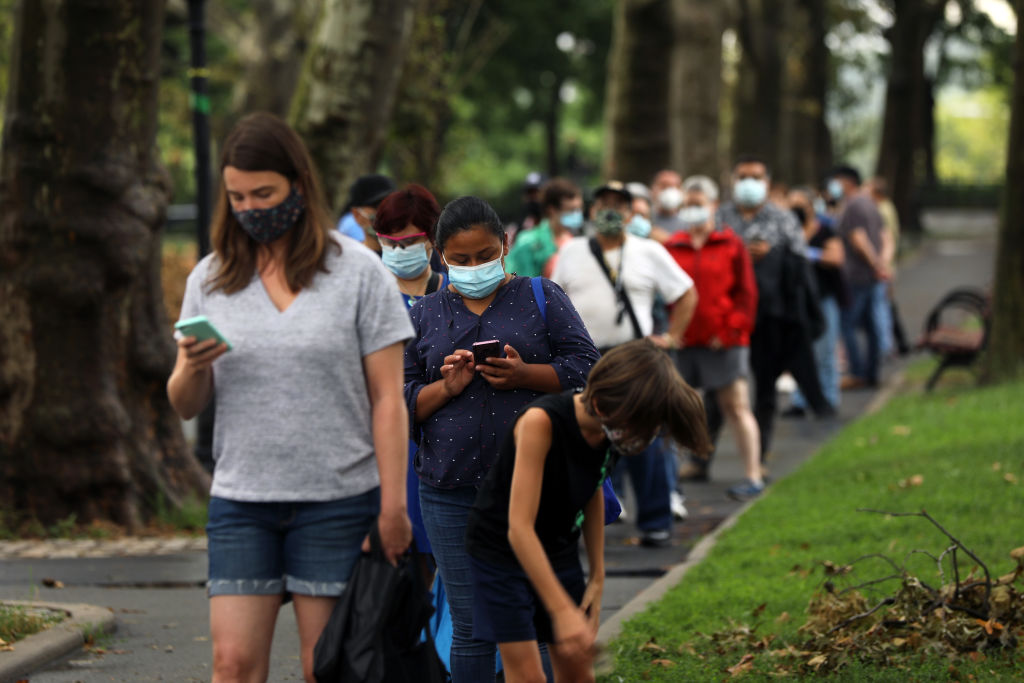New models suggest COVID-19 herd immunity might be achieved with far fewer people infected


A free daily email with the biggest news stories of the day – and the best features from TheWeek.com
You are now subscribed
Your newsletter sign-up was successful
COVID-19 researchers and modelers have assumed that at least 60 percent of a population, perhaps 70 percent, would need to be infected with the new coronavirus or vaccinated against it before reaching herd immunity, the point at which the virus can no longer spread widely among a community. Some infectious disease experts are now examining the "hopeful possibility" that far fewer people have to get infected or immunized to achieve herd immunity, The New York Times reports, citing interviews with more than a dozen scientists.
If their new, complicated statistical models are correct, and communities can reach herd immunity with 50 percent or less of people gaining immunity to COVID-19, "it may be possible to turn back the coronavirus more quickly than once thought," the Times reports. A clear minority of researchers predict as few as 10 or 20 percent of a population developing antibodies to the disease would be sufficient for herd immunity; Stockholm University mathematician Tom Britton calculated the threshold at 43 percent.
It's not clear any city or pocket of a city has sufficient immune people to thwart a second wave of COVID-19, but there may be parts of Mumbai, London, and New York that are close or have developed at least significant collective resistance. In hard-hit New York City, for example, fewer than 1 percent of people being tested in some neighborhood clinics over the past eight weeks have tested positive, the Times notes. Even a lower threshold "means many residents of the community will have been sickened or have died, a high price to pay for herd immunity."
The Week
Escape your echo chamber. Get the facts behind the news, plus analysis from multiple perspectives.

Sign up for The Week's Free Newsletters
From our morning news briefing to a weekly Good News Newsletter, get the best of The Week delivered directly to your inbox.
From our morning news briefing to a weekly Good News Newsletter, get the best of The Week delivered directly to your inbox.
And right now, the models are untested. "Mathematically, it's certainly possible to have herd immunity at these very, very low levels," Carl Bergstrom, an infectious disease expert at the University of Washington, tells the Times. "Those are just our best guesses for what the numbers should look like," but "they're just exactly that, guesses."
A free daily email with the biggest news stories of the day – and the best features from TheWeek.com
Peter has worked as a news and culture writer and editor at The Week since the site's launch in 2008. He covers politics, world affairs, religion and cultural currents. His journalism career began as a copy editor at a financial newswire and has included editorial positions at The New York Times Magazine, Facts on File, and Oregon State University.
-
 The Olympic timekeepers keeping the Games on track
The Olympic timekeepers keeping the Games on trackUnder the Radar Swiss watchmaking giant Omega has been at the finish line of every Olympic Games for nearly 100 years
-
 Will increasing tensions with Iran boil over into war?
Will increasing tensions with Iran boil over into war?Today’s Big Question President Donald Trump has recently been threatening the country
-
 Corruption: The spy sheikh and the president
Corruption: The spy sheikh and the presidentFeature Trump is at the center of another scandal
-
 Trump HHS slashes advised child vaccinations
Trump HHS slashes advised child vaccinationsSpeed Read In a widely condemned move, the CDC will now recommend that children get vaccinated against 11 communicable diseases, not 17
-
 FDA OKs generic abortion pill, riling the right
FDA OKs generic abortion pill, riling the rightSpeed Read The drug in question is a generic version of mifepristone, used to carry out two-thirds of US abortions
-
 RFK Jr. vaccine panel advises restricting MMRV shot
RFK Jr. vaccine panel advises restricting MMRV shotSpeed Read The committee voted to restrict access to a childhood vaccine against chickenpox
-
 Texas declares end to measles outbreak
Texas declares end to measles outbreakSpeed Read The vaccine-preventable disease is still spreading in neighboring states, Mexico and Canada
-
 RFK Jr. shuts down mRNA vaccine funding at agency
RFK Jr. shuts down mRNA vaccine funding at agencySpeed Read The decision canceled or modified 22 projects, primarily for work on vaccines and therapeutics for respiratory viruses
-
 Measles cases surge to 33-year high
Measles cases surge to 33-year highSpeed Read The infection was declared eliminated from the US in 2000 but has seen a resurgence amid vaccine hesitancy
-
 Kennedy's vaccine panel signals skepticism, change
Kennedy's vaccine panel signals skepticism, changeSpeed Read RFK Jr.'s new vaccine advisory board intends to make changes to the decades-old US immunization system
-
 Kennedy ousts entire CDC vaccine advisory panel
Kennedy ousts entire CDC vaccine advisory panelspeed read Health Secretary RFK Jr. is a longtime anti-vaccine activist who has criticized the panel of experts
